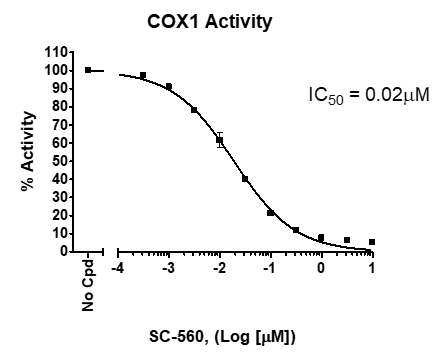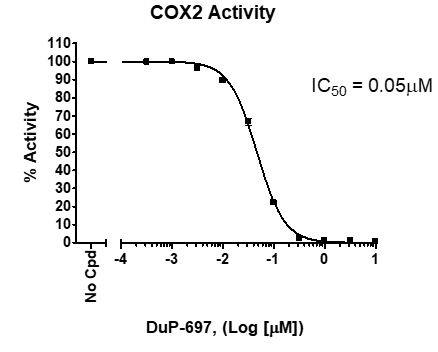COX1 & COX2 Screening Services
Prostanoids are signaling molecules which mediate inflammation and vasoconstriction. These signaling molecules are formed through the action of cyclooxygenase (COX) enzymes. Two COX isoforms exist, COX1 and COX2. COX1 helps to produce mucus lining for the stomach and is also expressed in a variety of other tissue types. Meanwhile, COX2 expression is generally restricted to inflamed cells and works to upregulate prostanoid levels.
COX enzymes have become a major target of interest for drug developers for a number of indications. Nonsteroidal anti-inflammatory drugs (NSAIDS) inhibit COX and in turn, prevent prostanoid production. NSAIDS like Aspirin inhibit COX, thereby preventing inflammation and decreasing pain levels. Additionally, COX enzymes are often overexpressed in many types of cancer including breast, prostate, lung, stomach, and esophageal cancer.
The link between COX expression and cancer progression is starting to be worked out. The product of COX2, PGH2, is subsequently converted to PGE2. The PGE2 lipidsuppresses T cells, providing cancer cells with an additional mechanism of immune evasion along with immune checkpoint pathways and other immune regulators like IDO/TDO, Arg, CD73 and CD39. Inhibiting COX2 has therefore become one of several new approaches being tested as a way to prevent T cell suppression.
COX inhibitors like celecoxib have been shown to enhance anti-tumor responses in mice. It has been demonstrated in mice that inhibition of COX enzymes causes inhibition of myeloid-derived suppressor cells (MDSCS), which suppress NK and T cells. Treatment with celecoxib resulted in reduced immune suppression by MDSCs. Also, other COX inhibitors such as parecoxib and valdecoxib have been shown to enhance proliferation of CD4+ and CD8+ T Cells, resulting in increased brain tumor cure rates in mice.
The COX enzymes are an important target in immunotherapy and have the potential to treat many types of cancer and to improve immunotherapy success rates. In addition to the COX 1 and COX2 proteins, BPS offers COX1/2 screening services. Using BPS’s COX screening services, we can help accelerate your research and drug discovery programs.
Trust us to provide you with high quality data with fast turnaround time. Our team of experts along with our broad services portfolio makes it easy to:
- Screen for inhibitors/targets using our COX assay
- Select from IC50 determination and single point concentrations
- Receive data within days of compound submission
- Perform follow-up studies using the same soluble receptors manufactured in-house
- Get questions answered or project guidance in a time-efficient manner
Contact us today to learn more about our COX1/2 screening services.
Get Started
Related Services
- Screening & Profiling
- Biochemical Assay Development
- Cell-Based Assay Development
- Protein Expression
- Cell Line Development



